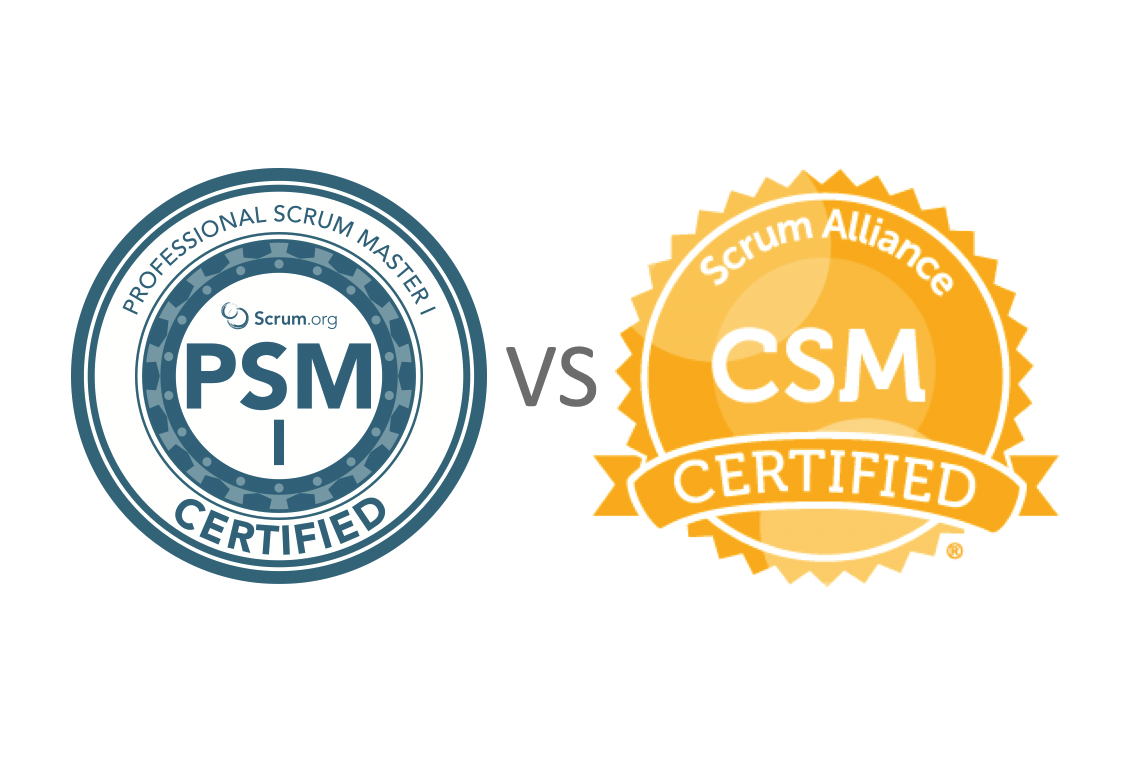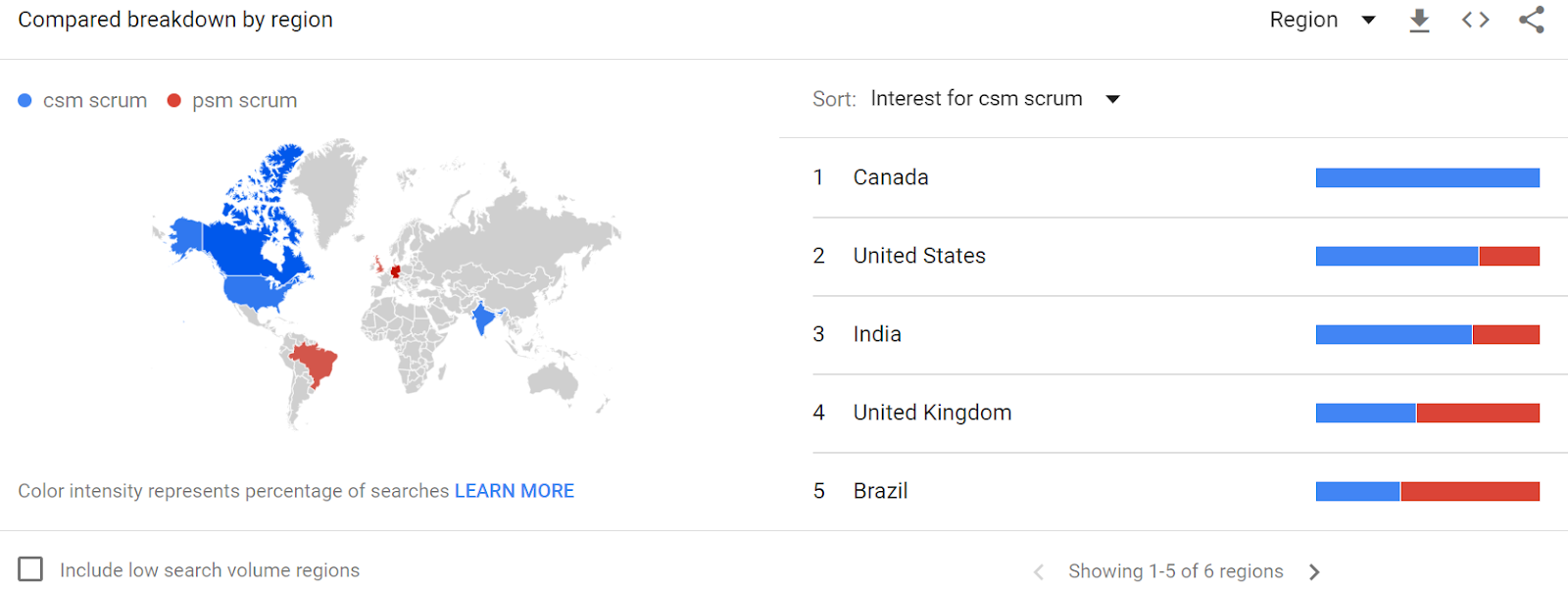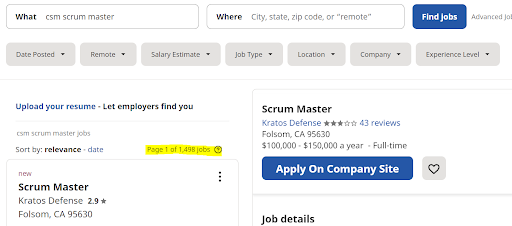
You are ready to start your search for a new job as a Scrum Master. It appears that most organizations require you to have a certification. Which Scrum Master certification should you choose? Perhaps you don't even have hands-on experience being a Scrum Master, what then?
Landing a Scrum Master position may be challenging for someone without any prior experience, since the role is fairly new in the corporate space. In addition, prerequisites will vary from company to company. The most obvious path would be to attend a training course and get a Scrum Master certification so that at minimum you stand out has having knowledge of the process.
But another question arises; Which certification should you choose? Currently, there are myriad options available, from an equally diverse list of providers. Just to name a few: Scrum Alliance, Scrum.org, Scrum Inc., Exin, Scrum Institute, CertiProf, or International Scrum Assembly.
By far, the most widely recognized are the ones from Scrum Alliance and Scrum.org. Let’s explore the details, compare them and see what they have in common as well as their differences. Full disclosure, I am a Certified Scrum Trainer® with the Scrum Alliance. I did have a choice on whether to go down the road of the CST or the PST (Scrum.org's equivalent). Naturally I carry some bias when people ask me which one is best, but I have sought to mitigate that bias with outside research.
This should in no way reflect my lack of respect for Scrum.org and Scrum Inc. I have many friends and colleagues that have chosen those organizations as their recognized association and I respect all of them equally because foundation-ally, we all share the same mission of helping people do better today than they did yesterday. We just might approach the work of that mission differently.
Scrum Alliance - Certified Scrum Master (CSM)
The CSM was historically the first Scrum Master certification in the market and it is still currently one of the most well known and recognized. Attending a two day Certified ScrumMaster® training course, delivered by a Certified Scrum Trainer®, is mandatory before taking the exam. The whole package, training + exam starts anywhere from $500 to $1,100 for live events depending on the trainer.
Naturally, it is not expected that you are an expert after two days of intense, hands-on workshops that focus on learning. It is that you are equipped to start gaining experience and learning on the job. The CSM® is indeed an entry-level certification that proves you have sought out knowledge on the topic and immersed yourself in an industry recognized course curriculum that you can then take back to your organization. The Scrum Alliance then offers advanced tracking for increasing your knowledge and experience (i.e. A-CSM, CSP-SM, etc...).
Scrum.org - Professional Scrum Master (PSM)
The PSM, or the PSM I, as it is officially known, is the entry level certification from Scrum.Org, which is also well-known and recognized. The organization has attempted to focus less on selling courses, so attending their training is recommended but it is not tied to the actual entry-level certification. The certification has a fixed price of $150, while the training is sold separately and comes at different prices.
You can achieve this certification simply with the knowledge you have now or learn on your own. In fact, you can sit for all of their exams (it appears) without having had purchased the courses. This seems to be a new direction for Scrum.Org. PSM II can be achieved for $250, and PSM III for $500. These are just exam costs, not the cost of attending a live instructed workshop. For more information, you can browse their certifications online.
What do they have in common?
Regardless of what training option you choose, you will get highly interactive, high quality training. Both organizations have very strong processes for vetting the trainers in regards to their knowledge, their course delivery and how they manage class dynamics.
Also, both courses have a minimum of 14 hours, usually spread over 2 days, and adhere to the latest Scrum Guide. The trainers have the flexibility to choose their way of delivering the information, as long as the course meets the learning objectives set out by Scrum Alliance / Scrum.org.
What sets them apart?
Beyond the price and the fact that the CSM® is tied to a course, while the PSM is not, there are some other things to take into consideration, when deciding which way to go.
The assessment
For the Scrum Alliance CSM®, you will take the test a maximum of 90 days after attending the workshop. The test consists of 50 questions which must be answered in 60 minutes. If you fail the first attempt, the second one is free, while any other extra attempts cost $25. To pass the test and earn the CSM® certification, a success score of 74% is required.
The PSM I test consists of 80 questions which must be answered in 60 minutes. If you attend a PSM course beforehand (remember, it’s not mandatory), then you have 2 free attempts. To pass the test and earn the PSM I certification, a success score of 85% is required.
Regarding the difficulty of the test, things can be pretty subjective, but the large majority of Scrum practitioners indicate that the PSM test is harder, since the number of questions is higher and they are also a bit tougher than in the CSM® entry level view of Scrum.
Certification expiration date
The 2 certification bodies have different approaches. While the PSM I certification never expires and you only have to pay once for it, the CSM® is valid for 2 years. The renewal cost is $100 and 20hrs of SEU are also required. SEUs are short for Scrum Education Units and they are credit earned by completing various trainings or learning opportunities that further your knowledge as a Scrum practitioner and demonstrate to the community your desire to continually learn against the changing environment of your domain.
Popularity
In the past 5 years, Google shows that the CSM® had a higher popularity than the PSM, when it comes to search queries.

We can also see, that there are countries which have a strong affinity for CSM®, like the US, Canada or India, while European countries like the UK and Germany, and Brazil, have a stronger affinity for the PSM.

The trend is also confirmed by the labor market. Looking at one of the main websites in the US, there are 1,498 open jobs requiring CSM®, at the moment of writing (July 2021).

In comparison, the PSM is required in only 342 jobs across the US.

Depending on the location, one of them may be more popular than the other, but still take into account that they are both very well regarded in the Agile world. While Scrum Inc is a bit newer since departing the Scrum Alliance, it will likely gain popularity as well (we have already seen its rise in the Latin American region).
Beware however of online offerings that claim to offer certification for simply watching a video or just buying the certification outright with minimum effort. If you want to stand out in the industry, the certification simply gets you in the door; once there you have to preform. So ask yourself, "which one of the certifications will actually equip me to perform", not just obtain a certification. A particular insightful article about Certiprof was provided on the Scrum.org forums by Eric Naiburg which highlight some issues with these types of certification.
Conclusion
When it comes to breaking into the Scrum world and getting a certification, either option will be good. The PSM provides better flexibility since the training is not mandatory, while the CSM® is a bit more popular in some parts of the world.
If you choose to attend a training course, pay attention when choosing the instructor. Even though they have a strong background in Agile and Scrum, a little research about them is recommended to ensure you are learning from a compatible personality and style.
If you happen to choose us, we would love to see you!